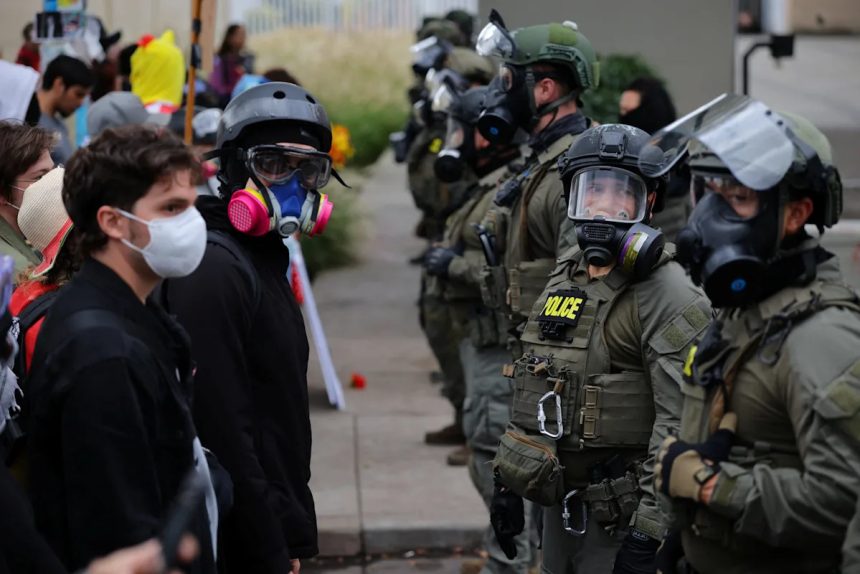Two hundred Oregon National Guard troops will remain federalized but cannot be deployed in Portland, the U.S. Court of Appeals for the Ninth Circuit said Oct. 8.
Senior Circuit Judge Susan Graber and circuit judges Ryan Nelson and Bridget Bade issued an administrative stay, pending oral arguments scheduled for 9 a.m. Oct. 9.
The stay blocks an Oct. 4 order by U.S. District Court Judge Karin Immergut that stopped the federalization and deployment of the Oregon National Guard. It does not impact a temporary restraining order from the following day that stops any federalized National Guard troops from deploying into Portland. That means the Oregon troops are still under federal status, but because of the second order they cannot be deployed.
During the Oct. 9 hearing, judges will consider the Trump administration’s request for the appeals court to lift the temporary restraining order that Immergut granted and allow the Oregon National Guard troops to be deployed while the case proceeds.
Protesters stand in front of law enforcement officers during a protest at U.S. Immigration and Customs Enforcement headquarters in Portland on Oct. 4.
The administrative stay is intended to “preserve the status quo,” where Oregon National Guard members are under federal control but have not been deployed, the judges ordered.
Oregon Attorney General Dan Rayfield said that while it doesn’t affect the troops’ current status, the stay by the court is a good thing.
“While it keeps the Oregon National Guard under federal status, most importantly, it prevents the President from deploying the guard in Portland,” Rayfield said. “That means no unnecessary federal escalation — and that’s a win for Oregonians who want calm, not conflict in our communities.”
In a statement, Gov. Tina Kotek urged Oregonians to remain calm.
“Oregon is our home, not a military target,” Kotek said. “I ask that Oregonians who want to speak out do so peacefully. I will keep holding the line against President Trump’s abuse of power and stand up for Oregonians.”
U.S. Sen. Ron Wyden, D-Oregon, said in a statement “Oregon keeps beating Trump in court because the streets of Portland are peaceful. Every person in Portland is responsible for these victories.”
The Trump administration filed the appeal Oct. 4, shortly after Immergut granted Oregon’s first temporary restraining order, blocking the Oregon National Guard from being deployed for two weeks.
The following day, a new temporary restraining order was granted to stop the deployment of National Guard members from any state after 200 California National Guard members were sent to Oregon and Kotek said she had learned Texas National Guard would be sent as well.
California joined the lawsuit as a plaintiff Oct. 5.
That order is set to expire Oct. 19. A hearing on potentially extending the restraining order is scheduled for Oct. 17, with a hearing over a longer block on Oct. 29.
On Oct. 7, Kotek called on the military to send the Oregon and California National Guard troops staging at Oregon bases home.
In a letter to U.S. Northern Command Commander General Gregory Guillot, Kotek said the National Guard members who had been called for “an illegal mission” should be demobilized in response to the temporary restraining order.
The 200 Oregon National Guard members, who began arriving Sept. 30 for intake and training are staying at Camp Rilea in Warrenton. The troops are from Salem and Woodburn units that have previously been trained in crowd control.
Deploying the Oregon National Guard for 60 days could cost up to $10 million in federal funds, Kotek said.
Trump first announced that troops would be deployed to Portland on Sept. 27 through social media. Oregon and Portland sued the next day.
Anastasia Mason covers state government for the Statesman Journal. Reach her at acmason@statesmanjournal.com or 971-208-5615.
This article originally appeared on Salem Statesman Journal: Court says 200 Oregon National Guard troops can remained federalized









